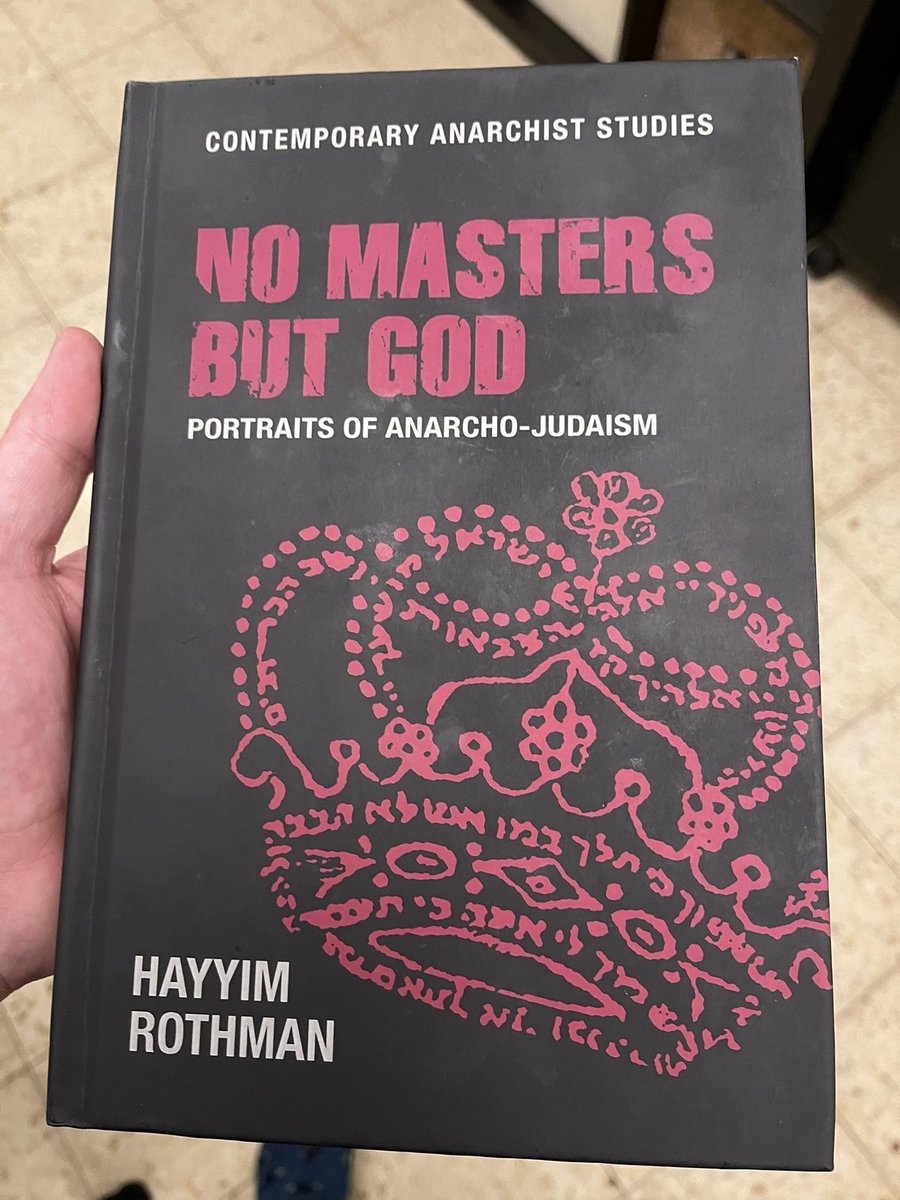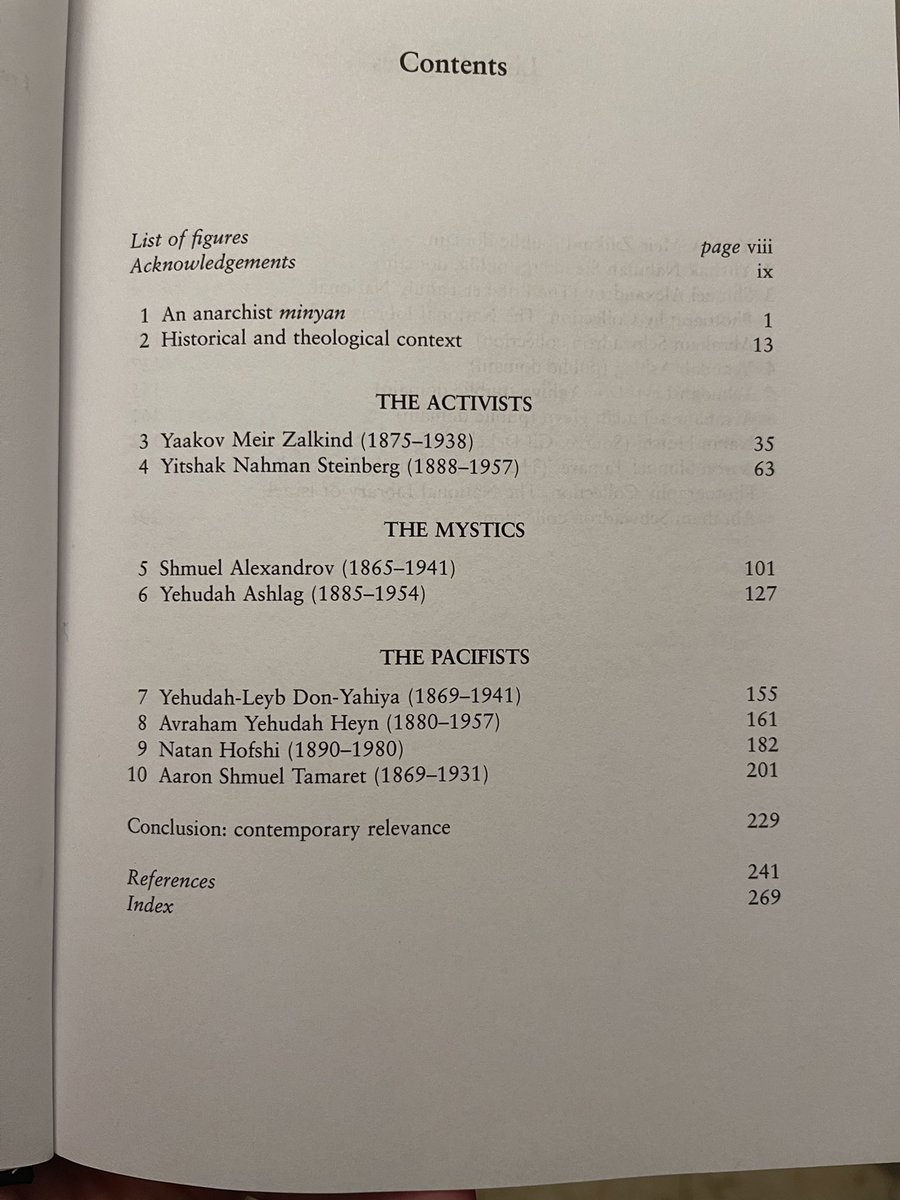
“Thou Shalt Not Kill,” one of Avraham Yehudah Chein’s key essays, explores three different versions of the commandment, “Thou shalt not kill”: Collectivist, Individualist/Egoist, and the Jewish-Instinctive model.
🧵
1/

🧵
1/


“Thou shalt not kill,” he points out, can be a way of protecting the collective. Any individual lopped off the collective hurts the collective, so the imperative maintains its health and integrity. However, because the imperative serves the aims of the collective,
2/
2/
it can also be suspended for the sake of the collective. This is essentially what happens not only in war, he says, but also in capital punishment: the individual is killed in order to prevent further violence within or against the collective.
3/
3/
(In this context he also notes, intriguingly, that concern for the future is also a form of collectivism.)
4/
4/
The second model, which he associates with the anarchist thinker Peter Kropotkin, sanctifies not the collective, but the individual. This model takes individual freedom as its starting point: no one may impose upon an individual’s freedom.
5/
5/
This (theoretically) leads individuals to accept upon themselves the command of “Thou shalt not kill,” because they recognize that others will act toward them as they act toward others. However, Chein criticizes this model on two fronts:
6/
6/
1) that sort of radical individualism misses the way both our material and spiritual lives are made possible only through the contributions of others, and 2) “Thou shalt not kill” is thus made subordinate, because if it comes down to the life of the self or the other,
7/
7/
the self will take precedence every time. In this model, you should in fact kill for the sake of self-preservation.
Chein contrasts this with his final model, based on the talmudic discussion of cardinal Jewish law, instances when a Jew should “be killed but not transgress.”
8/
Chein contrasts this with his final model, based on the talmudic discussion of cardinal Jewish law, instances when a Jew should “be killed but not transgress.”
8/
The Talmud explains the injunction to be killed rather than killing someone (imagining a forced choice) by saying “it’s logical” and “who says your blood is redder than his??” There’s an immediacy and “naturalness” here that appeals to Chein.
9/
9/
In this model, you can’t ever supersede “Thou shalt not kill,” because it’s not based on any ideology. It’s just instinctive, and therefore it is fundamental.
He makes other points throughout the essay, but this is the body of it, broadly speaking.
10/
He makes other points throughout the essay, but this is the body of it, broadly speaking.
10/
One of the moves he makes after this, flowing from his final model, is to critique the way ideology can serve to sanctify violence. In anarchist terminology, he’s demanding “means-ends correspondence,” meaning that you can’t use violence to achieve non-violence.
11/
11/
Along the way, he provides powerful interpretations of some key Jewish texts. Here is that section translated into English:
"…
“Do not build [the altar] of hewn stones; for by wielding your tool upon them you have profaned them.” (Exodus 2:22)
12/
"…
“Do not build [the altar] of hewn stones; for by wielding your tool upon them you have profaned them.” (Exodus 2:22)
12/
“Since iron was created to shorten man’s days and the altar was created to prolong man's days, and it is not right therefore that that which shortens should be lifted against that which prolongs.” (M. Middot 3:4)
“An altar cannot be created through iron.”
13/
“An altar cannot be created through iron.”
13/
The world over, in all generations, no altar has been created except through iron. Iron has been rendered permissible for making an altar, for any altar in the world. Moreover, it has become acceptable for vessels of service, for holy vessels—
/14
/14
not only for the altar of kingship and politics, which exists only through iron.
In the meantime, “the mountains have moved, and the hills have bent.” Humans have encroached ancient boundaries. They’ve turned bowls on their heads.
15/
In the meantime, “the mountains have moved, and the hills have bent.” Humans have encroached ancient boundaries. They’ve turned bowls on their heads.
15/
Knowledge has driven out faith, the liberated mind has conquered nature, and the ancient teaching (torah) of “Tuval Kayin” has not budged from its place even one bit. “Today” never ceases to shatter the idols of “yesterday” and dismiss its slogans (matbe’otav).
16/
16/
That old, wizened idol, the most aged and weathered of all—the idol of the sword—persists unchanged.
Humanity has made countless new discoveries, built “castles in the clouds,” and created wireless telephones, yet it has found no new way to solve political problems or
17/
Humanity has made countless new discoveries, built “castles in the clouds,” and created wireless telephones, yet it has found no new way to solve political problems or
17/
legal-political issues…
Humanity continues to build the altars of the state and the kingship using iron, based on the most ancient, primordial formula. It is a total, wizened conservative in this respect. It has discovered no new approaches to this problem.
18/
Humanity continues to build the altars of the state and the kingship using iron, based on the most ancient, primordial formula. It is a total, wizened conservative in this respect. It has discovered no new approaches to this problem.
18/
Humanity has made not even a single step forward in this context. It has even regressed—and regressed a great deal. It has multiplied the number of altars above and beyond the era of the Baal and the Ashera idols, “on each mountain and high hill, and under each verdant tree.”
/19
/19
It has even multiplied the number of sacrifices, multiplied them beyond all measure, calculation, or knowledge.
This is true not only of these altars—which were originally created for the gods of blood—nor only for the gods of faiths and religions—
/20
This is true not only of these altars—which were originally created for the gods of blood—nor only for the gods of faiths and religions—
/20
which generally also exist only through fire and iron. “And whoever does not fall down and worship shall be thrown into a burning fiery furnace” (Daniel 3:11); “What were they arguing about? One said: the Holy Temple will be built in my boundary. The other said:
/21
/21
the Holy Temple will be built in my boundary” (Genesis Rabbah 22:7). It is also true of the altars of pure science, though there may be some that are build other than on blood, other than through the destruction of humanity. How many souls have been swallowed up, for example,
/22
/22
by those “castles in the clouds” since they first arose in the minds of their creators—more than could possibly be counted. And so too many, many of humanity’s most beautiful inventions.
The pleasant, beautiful, dressed-up world with its “great teaching of love”—
/23
The pleasant, beautiful, dressed-up world with its “great teaching of love”—
/23
a new religion of truth founded by the students of Marx, who stabbed their teacher and paved over him—happily, joyously justifies the judgment, and accepts the suffering of the other—even their death—with eternal love…
/24
/24
Were not the former, ancient days better than these—ethically speaking? In those days, the people did not bandy about discussion of “means.” Those mighty heroes, who came so long before their spiritual grandchildren and great grandchildren, did not act based on
/25
/25
some “sanctification.” They didn’t seek a seal of approval (hekhsher) for their actions. They didn’t appeal to any ideology when they killed, slaughtered, barbarized, and destroyed. They just saw some gain for themselves in it, or were simply following their evil inclinations.
26
26
In most instances, they deceived neither other people nor themselves. They bowed proudly and wholeheartedly to iron and to the fist. Today, however, people come with “the power of permission,” with the power of the Torah…
27/
27/
No one slaughters without making a blessing, and no one kills without mentioning God’s name and God’s kingship.
The sword now has a scabbard, the blade is bound up in the book. The blood has received a seal of approval (hekhsher).
28/
The sword now has a scabbard, the blade is bound up in the book. The blood has received a seal of approval (hekhsher).
28/
Once, no one would have entered the Temple while “impure due to contact with a corpse.” “They would not have raised their hands.” The great quantity of blood spilled used to keep those who spilled it from sleeping, stabbing into their brains like that famous mosquito.
29/
29/
30/30
*
Then came the great teaching of “the ends justify the means” and made them feel better. The work of slaughter became “the work of Heaven.”
…
30/30
Then came the great teaching of “the ends justify the means” and made them feel better. The work of slaughter became “the work of Heaven.”
…
30/30
• • •
Missing some Tweet in this thread? You can try to
force a refresh











